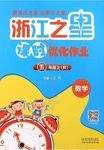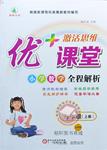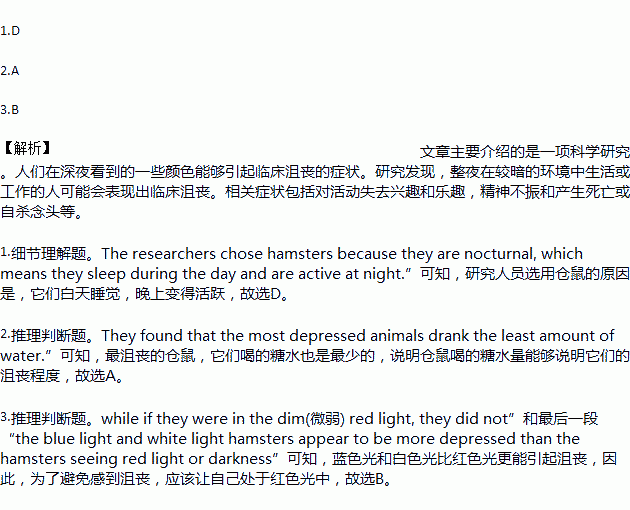题目内容
Some colors people see late at night could cause signs of clinical(临床的)depression (沮丧). That was the finding of a study that builds on earlier study findings. They show that individuals (个人) who live or work in low levels of light overnight (整夜) can develop clinical depression. Doctors use the word “clinical depression” to describe severe form of depression. Signs may include loss of interest or pleasure in most activities, low energy levels and thoughts of death or suicide.
In the new study, American investigators designed an experiment that exposed hamsters(仓鼠)to different colors. The researchers chose hamsters because they are nocturnal(夜行的), which means they sleep during the day and are active at night.
The animals were separated into four groups. One group of hamsters was kept in the dark during their night-time period. Another group was placed in front of a blue light, a third group slept in front of a white light, while a fourth was put in front of a red light.
After four weeks, the researchers noted how much sugary water the hamsters drank. They found that the most depressed animals drank the least amount of water.
Randy Nelson heads the Department of Neuroscience at Ohio State University. He says animals that slept in blue and white light appeared to be the most depressed. “What we saw is that these animals didn’t show any sleep uneasiness (不安) at all but they did mess up biological clock genes and they did show depressive sign while if they were in the dim(微弱)red light, they did not.”
Randy Nelson notes that photosensitive(感光)cells in the eyes have little to do with eyesight. He says these cells send signals to the area of the brain that controls what has been called the natural sleep-wake cycle.
He says there’s a lot of blue in white light. This explains why the blue light and white light hamsters appear to be more depressed than the hamsters seeing red light or darkness.
1.Researchers use hamsters in the experiment because __________.
A. they are similar to humans in dealing with colors
B. they are easy to observe and study
C. they are sensitive to colors like human beings
D. they are active at night and sleep during the day
2.What sign shows that the hamsters are being depressed?
A. They drink less sugary water. B. They don’t sleep well.
C. Their eyesight becomes worse. D. Their energy level becomes low.
3.What can help people who work late at night to avoid being depressed?
A. Not being exposed to dim red light when using computers.
B. Equipping their computer screens to put it more in the reddish light.
C. Living or working in low levels of light overnight.
D. Going to see doctors of clinical depression regularly for help.
 浙江之星课时优化作业系列答案
浙江之星课时优化作业系列答案 激活思维优加课堂系列答案
激活思维优加课堂系列答案
